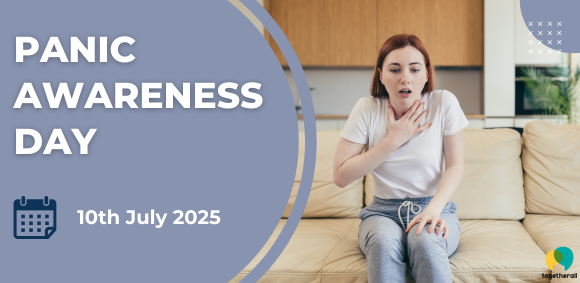Panic Awareness Day, observed annually on the 10th of July, is dedicated to raising awareness about panic disorders and attacks, conditions that affect millions worldwide but is often misunderstood. This crucial day aims to reduce stigma, promote mental health resources, and educate people on how to manage panic attacks and support others who experience them.
What is a panic disorder?
A panic disorder is a type of anxiety disorder where you have recurrent and unexpected panic attacks. A panic attack is a sudden episode of intense of fear/anxiety and is often accompanied by physical symptoms such as:
- A racing heartbeat
- Shortness of breath
- Dizziness
- Sweating
- Trembling
- Numbness or tingling
- Chest pain
- Nausea
- Muscle tension
- Dissociation
Many people describe the feeling as if they are losing control or even having a heart attack. These attacks can occur without warning and sometimes without any identifiable triggers.
The impact a panic disorder can have on somebody
The effects of a panic disorder extend far beyond just the attacks, people with this disorder often avoid certain events, places, and situations where they might experience an attack. This avoidance can significantly impact their daily lives and limit their activities, leading to feelings of isolation and frustration.
Here are some techniques that you could use to help manage and cope with panic attacks:
- Breathing exercises: one of the quickest ways to calm down during a panic attack is to try focusing on your breathing. You could use apps like Calm and Headspace to guide you through deep breathing exercises and meditation.
- Cognitive Behavioural Therapy (CBT): is a talking therapy that can help you manage your problems by changing the way you think and feel.
- Physical Exercise: regular physical activity can help reduce anxiety levels and improve overall mental health.
- Medication: you can be prescribed anti-anxiety medication or antidepressants by your doctor to help this condition.
- Try doing some yoga to help you relax.
- Support groups: it might be nice to connect with other people either online or in your local area that are going through the same thing as you.
How you can get involved
- Educate yourself: Learn more about panic disorders and how to support those who experience them.
- Spread awareness: share information about panic disorders and attacks by having open conversations with people around you or via social media.
- Donate: support mental health organisations that provide resources and support for individuals with panic disorders.
- Support others that are affected by panic by being nonjudgmental and offering a listening ear.
In conclusion, panic awareness day provides a platform to educate the public and support those affected by panic disorders and attacks. By raising awareness and understanding we can help reduce the stigma and misconceptions that surrounds this condition, therefore empowering individuals to seek help, manage symptoms and improve their overall wellbeing.
Support and Resources for CAW Students
As a student of The College of Animal Welfare, you get FREE access to a wide variety of resources and support via the togetherall app; there is a great short online course on how to manage panic. Togetherall also has forums so you can discuss any worries with others, and access to trained counsellors 24/7. If you haven’t set up an account, you can do so FREE of charge with your CAW email address.
If you are struggling with your mental health or any aspect of college life, remember you can access up to six confidential counselling sessions free of charge: full details can be found here.

